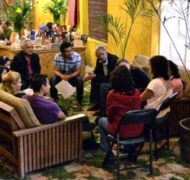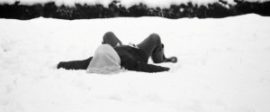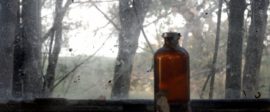Ruth and Parables: Small Group Leaders Guide Week 1
Small Group Study / Produced by Individual TOW Project member
This content is part of the Ruth and Parables curriculum, an 11-week integrated sermon and small group series on faith and work.
Note to small group leaders: for the 11-week series titled “Inspired: The Whole of Life with God in the Picture” the small group leader’s guide will be based on the readings, sermon, and fill-in-the-blanks from each Sunday morning. We’ll discuss some of the background, make some connections, and raise some questions your group may find helpful. Feel free to use as much or as little as you choose.
Introduction to the 11-week series grounded in the Book of Ruth:
“This fall, Ruth will give us immigrants and refugees, family drama and local politics. It will raise issues about the law and economics and how to manage personal wealth or poverty. There’ll be efforts to move out of unemployment and rather creative sexual advances to move out of singlehood. It’s an earthy, whole life story, this book of Ruth. But it starts amidst crushing tragedy. So where better place to ask if it’s possible to find wonder and joy, in all our lives, all the time, then to take a quick look at a woman who’s hit rock bottom.”–Steve Watson.
Read Ruth 1:1-2
Ruth takes place during the worst time in Israel’s history. “The days when the judges ruled in Israel” (Ruth 1:1) are described in the book of Judges, the book of the Bible just before Ruth. Over and over again, Judges says, “the people did evil.” The book ends with an horrific scene of kidnapping, rape murder and mayhem that ends with this line: “In those days Israel had no king; all the people did whatever seemed right in their own eyes” (Judges 21:25). This is not meant as a compliment.
As a result of the people’s evil, the land of Israel is filled with conflict and famine. Then as now, war and poverty often go together. Facing starvation, Naomi and her husband and two sons move to the nation of Moab looking for food. So we are reading the story of a refugee family.
The nation of Moab neighbored Israel. Moabites and Israelites recognized one another as relatives, yet also as antagonists. Not exactly enemies, but in occasional conflict for centuries, especially over territory and religion. The closest analogy today might be between Muslims in the Middle East and Christians in the West. If you imagine a Hungarian family seeking refuge in Syria in World War II, or vice versa today, you have an idea of the desperation and vulnerability involved, yet also the slender possibility of hope. You need only to read today’s paper to read Naomi’s story.
There is a bitter irony for Naomi’s family because they are part of God’s people. Having made it to God’s promised land (“flowing with milk and honey”) they are now forced to flee into foreign territory to find food. How could God have led Israel to the promised land, only to let them starve there? The Israelites had made the same complaint to Moses after crossing the Red Sea: “You have brought us into this wilderness to starve us all to death”(Exodus 16:3).
Naomi is facing more than just disappointment and shattered hopes. She is seeing God’s promises appear to come crashing down around her. The promise of good work and prosperity (milk and honey) turns to unemployment and famine. The promise of being one of God’s people turns to becoming a stranger in a strange land. The promise of a man and a woman becoming “one flesh” and becoming fruitful and multiplying (Genesis 2:24; 1:28) turns in to becoming a widow “bereft of children, but not of hope,” as Steve Watson’s teacher, Ken Jones, put it.
Question 1
Have you experienced tragedy or what can only be described as the failure of God’s promises? Have you, like Stephen Colbert, Joe Biden, and Ken Jones found wonder, hope and even joy in the midst of loss and tragedy? What made that possible? How do the tragedies that other people face—whether Syrian refugees or neighbors across the street—affect you?
Read Ruth 1:3-6
Widows in the ancient Near East generally lost all economic status. That would equate to homeless or unemployability in American society. Along with aliens and the fatherless, widows received a great deal of attention in the Law of Israel. They were easy targets for economic and social abuse and exploitation. Many resorted to prostitution simply to survive, a situation all too common for vulnerable women in our day as well.
Suddenly, a potential solution for Naomi, Orpah, and Ruth arises. The Lord seems to be forgiving Israel for their evil ways, and blessing them with good crops again. In the ancient Near East, deity played the most important role in cause and effect, both in history and in nature. In our worldview we would be inclined to identify human or natural cause and effect first and then mention that “of course, God was behind it all.” In the ancient Near East, it would be the other way around. God would be identified as the cause behind famine or war, with natural or human causes given secondary notice, if mentioned at all.
Naomi can now return to Israel and hope to find relatives who would take her into their families there. No longer would she have to try to survive as a widowed, alien woman in a hostile country. Yet, if she returns to Bethlehem with her daughters-in-law, the younger women would be widows and aliens in Israel. Every choice she faces is a hard choice.
Question 2
Even though Naomi had known bitter disappointment, she found hope for God’s blessing in her life, and she is willing to risk everything to receive it. Have you ever taken a big risk in order to receive what you hope will be blessings from God? What was that like? Are you facing a decision like this right now? What is it that gets you moving? Do you stay home and endure the discomfort you know in familiar surroundings. Or do you up stakes and move on into a possible promise but still uncertain future in unfamiliar circumstances. What will help you decide?
Matthew 13:24-30
The parable of the wheat and the weeds seems to say that we can find wonder, joy, and hope in the very mixed circumstances of our lives. “Biblical realism is not utopianism nor fatalistic despair,” according to Steve’s sermon. “Reality is the friend of God.” The art of life not to search for perfect conditions in order to begin living, but to begin living no matter what conditions you’re in. Steve’s fill-in-the blank suggests four steps for doing this (see separate attachment.)
Question 3
Which of the four steps have ever tried? How did it/they work for you? Which steps do you think might help you right now?
What do you find personally challenging for you in this?
The farmer in the parable says that the wheat and the weeds are so entangled that if you pull up the weeds, you’ll end up pulling up the wheat. What “wheat” in you or in your life is so precious that it’s worth preserving, even at the risk of weeds? What weeds are you chopping that maybe you should let grow a while longer? Are all the weeds and wheat in your life entangled like this, or only some?











